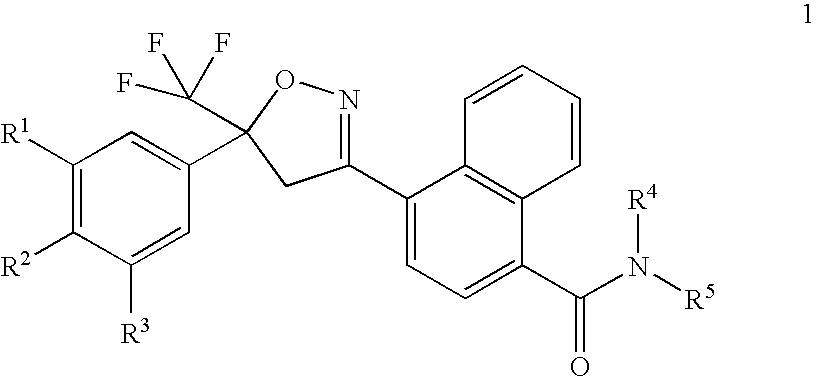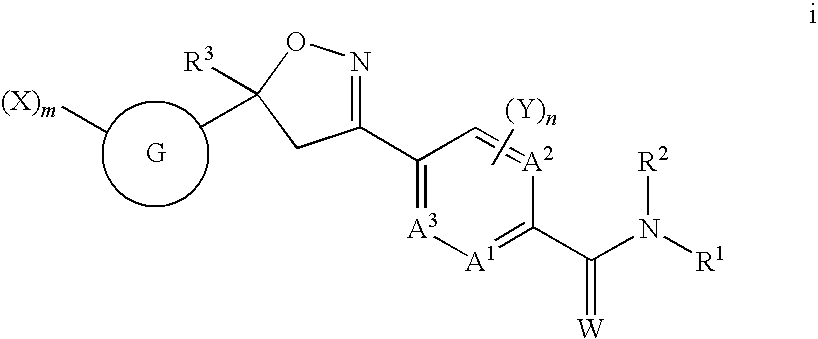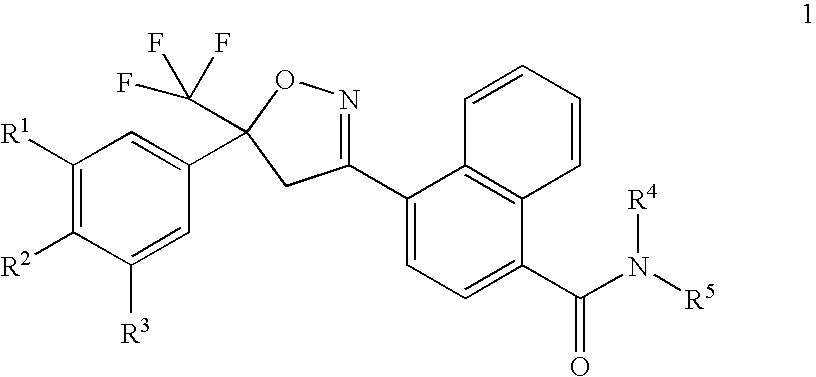Naphthalene isoxazoline invertebrate pest control agents
a technology of invertebrate pest control and naphthalene isoxazoline, which is applied in the direction of antiparasite agents, biocides, drug compositions, etc., can solve the problems of increasing consumer costs, affecting the effectiveness of existing methods of treatment and parasite control, and reducing productivity
- Summary
- Abstract
- Description
- Claims
- Application Information
AI Technical Summary
Benefits of technology
Problems solved by technology
Method used
Image
Examples
synthesis example 1
Preparation of 4-[5-(3,5-dichlorophenyl)-4,5-dihydro-5-(trifluoromethyl)-3-isoxazolyl]-N-[2-(methylthio)ethyl]-1-naphthalenecarboxamide
Step A: Preparation of methyl 4-[(hydroxyimino)methyl]-1-naphthalenecarboxylate
[0290]A solution of hydroxylamine (1.33 mL, 50% in water) was added to a stirred solution of methyl 4-formyl-1-naphthalenecarboxylate (2.2 g, prepared as described in Journal of Medicinal Chemistry 2002, 45(26), 5755-5775) in methanol (50 mL). After stirring at room temperature for 2 h, the reaction mixture was concentrated under reduced pressure to provide the title compound as a pale yellow solid (2.55 g). 1H NMR (CDCl3): δ 8.93 (d, 1H), 8.86 (s, 1H), 8.41 (d, 1H), 8.14 (d, 1H), 7.82 (d, 1H), 7.63 (m, 2H), 4.02 (s, 3H).
Step B: Preparation of methyl 4-[5-(3,5-dichlorophenyl)-4,5-dihydro-5-(trifluoromethyl)-3-isoxazolyl]-1-naphthalenecarboxylate
[0291]N-Chlorosuccinimide (1.16 g, 8.72 mmol) was added to a stirred solution of methyl 4-[(hydroxyimino)methyl]-1-naphthalenecarb...
synthesis example 2
Preparation of 4-[5-(3,5-dichlorophenyl)-4,5-dihydro-5-(trifluoromethyl)-3-isoxazolyl]-N-[2-(methylsulfinyl)ethyl]-1-naphthalenecarboxamide
[0294]m-Chloroperoxybenzoic acid (47 mg, 70% purity) was added at −78° C. to a stirred solution of 4-[5-(3,5-dichlorophenyl)-4,5-dihydro-5-(trifluoromethyl)-3-isoxazolyl]-N-[2-(methylthio)ethyl]-1-naphthalenecarboxamide (i.e. the product of Example 1, Step D, 100 mg) in dichloromethane (10 mL). The reaction mixture was stirred at −78 to −70° C. for 2.5 h, then quenched with saturated aqueous sodium bicarbonate and extracted with dichloromethane. The organic extract was washed with brine, dried over sodium sulfate, and concentrated under reduced pressure to provide the title compound (102 mg), a compound of this invention, as a white solid. 1H NMR (CDCl3): δ 8.78 (d, 1H), 8.29 (d, 1H), 7.42-7.64 (m, 7H), 7.37 (br t, 1H), 4.23 (d, 1H), 4.00 (q, 2H), 3.88 (d, 1H), 3.18 (dt, 1H), 2.89 (dt, 1H), 2.62 (s, 3H).
synthesis example 3
Preparation of 4-[5-(3,5-dichlorophenyl)-4,5-dihydro-5-(trifluoromethyl)-3-isoxazolyl]-N-[2-(methylsulfonyl)ethyl]-1-naphthalenecarboxamide
[0295]H2O2 (0.056 mL, 30% in H2O) was added to a stirred solution of 4-[5-(3,5-dichlorophenyl)-4,5-dihydro-5-(trifluoromethyl)-3-isoxazolyl]-N-[2-(methylsulfinyl)ethyl]-1-naphthalenecarboxamide (i.e. the product of Example 2, 100 mg) in acetic acid (1.0 mL). The reaction mixture was stirred at 60° C. for 4 h, then cooled to room temperature, diluted with water, adjusted to pH 4 with 1.0 M aqueous NaOH solution, and extracted with chloroform. The organic extract was washed with brine, dried over sodium sulfate, and concentrated under reduced pressure to provide the title compound (100 mg), a compound of this invention, as a white solid. 1H NMR (CDCl3): δ 8.80 (d, 1H), 8.29 (d, 1H), 7.43-7.66 (m, 7H), 6.94 (br t, 1H), 4.24 (d, 1H), 4.04 (q, 2H), 3.40 (t, 2H), 3.01 (s, 3H).
PUM
| Property | Measurement | Unit |
|---|---|---|
| composition | aaaaa | aaaaa |
Abstract
Description
Claims
Application Information
 Login to View More
Login to View More - R&D
- Intellectual Property
- Life Sciences
- Materials
- Tech Scout
- Unparalleled Data Quality
- Higher Quality Content
- 60% Fewer Hallucinations
Browse by: Latest US Patents, China's latest patents, Technical Efficacy Thesaurus, Application Domain, Technology Topic, Popular Technical Reports.
© 2025 PatSnap. All rights reserved.Legal|Privacy policy|Modern Slavery Act Transparency Statement|Sitemap|About US| Contact US: help@patsnap.com



